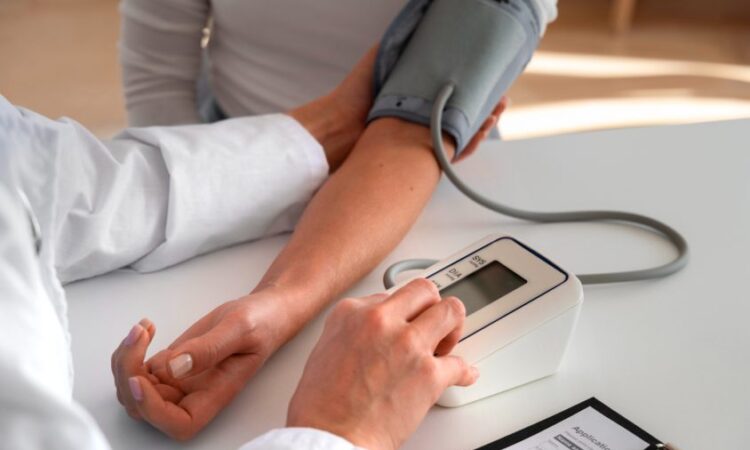
Often called the “silent killer”, high blood pressure may not show obvious symptoms until it reaches a critical stage. Many individuals may have this condition without realizing it, making regular check-ups essential.
The Symptoms
Before we talk about the symptoms, it has to be stated how important medical evaluation at a reputed healthcare facility is. If you experience any of these symptoms, visiting the best multispeciality hospitalnear you can provide comprehensive diagnostics and care.
Specialists in cardiology and internal medicine can assess your condition and recommend suitable treatment plans.
While commonly associated with headaches or dizziness, there are lesser-known signs that may indicate elevated blood pressure levels. Recognizing these signs early and consulting a medical professional can prevent potential complications.
Blurred or Distorted Vision
Vision changes can sometimes be linked to blood pressure fluctuations. Persistent blurriness or sudden vision issues might indicate an underlying concern. High blood pressure can damage the small blood vessels in the eyes, leading to a condition known as hypertensive retinopathy.
It is important to consult a healthcare professional if you experience such symptoms, as untreated vision problems could worsen over time.
Unexplained Fatigue
Feeling excessively tired despite getting enough rest can be a warning sign. While fatigue can result from various causes, prolonged exhaustion might suggest an issue with circulation or oxygen supply, factors affected by high blood pressure.
This occurs because the heart has to work harder to pump blood, leading to reduced efficiency in oxygen distribution throughout the body. Individuals who experience persistent fatigue should consider checking their blood pressure levels regularly.
Frequent Nosebleeds
Occasional nosebleeds are common and not always a cause for concern. However, if they occur frequently without an apparent cause, it is advisable to check your blood pressure levels.
Hypertension can weaken the blood vessels in the nose, making them more prone to rupturing. While nosebleeds alone do not confirm high blood pressure, they should not be ignored, especially when accompanied by other symptoms.
Shortness of Breath
Difficulty breathing, especially during rest or mild activity, may be linked to cardiovascular strain. High blood pressure can lead to fluid accumulation in the lungs, making breathing more difficult.
This symptom should not be ignored, as it could indicate complications related to hypertension, including heart failure or pulmonary hypertension. If you frequently experience shortness of breath, seeking medical attention is crucial.
Chest Discomfort or Irregular Heartbeat
Although not always directly linked to high blood pressure, chest discomfort or palpitations can be associated with increased cardiovascular stress. Hypertension places additional strain on the heart, potentially leading to irregular heart rhythms or even severe cardiac conditions.
Monitoring such symptoms and seeking medical advice is crucial to prevent serious health issues.
Cognitive Changes and Confusion
Sudden difficulty in concentration or memory lapses may sometimes be connected to blood pressure irregularities. Hypertension can affect blood flow to the brain, leading to cognitive decline over time.
Proper diagnosis and timely intervention can help in managing these concerns effectively. If you notice unexplained confusion or memory problems, consulting a healthcare professional is advisable.
Understanding Normal Blood Pressure Levels
Normal blood pressure is important for overall health. A standard reading is generally around 120/80 mmHg. Readings above this range may indicate the need for lifestyle adjustments or medical consultation.
Consistently high readings over 140/90 mmHg may suggest hypertension, which requires further medical evaluation.
Risk Factors to Consider
Several factors can contribute to elevated blood pressure levels, including:
- A sedentary lifestyle
- High sodium intake
- Chronic stress
- Underlying medical conditions
- Excessive alcohol or tobacco use
- Obesity or being overweight
- Family history of hypertension
Early detection and lifestyle modifications can play a key role in managing hypertension. Regular monitoring and adherence to medical advice help in reducing long-term health risks.
The Importance of Regular Monitoring
Regular health screenings are crucial in identifying blood pressure concerns early. Keeping track of your readings helps in maintaining long-term cardiovascular health. Home monitoring devices and routine doctor visits are effective ways to ensure stability in blood pressure levels.
Lifestyle changes such as exercise, a balanced diet, and stress management can significantly help in maintaining optimal blood pressure.
The Relation Between Hypertension and Other Health Conditions
Hypertension or high blood pressure is closely linked to other medical conditions, including stroke, kidney disease, and heart attacks. Uncontrolled high blood pressure can weaken the arteries over time, increasing the risk of life-threatening complications.
Managing hypertension through prescribed medications and healthy habits can reduce these risks significantly.
What You Can Do Next
Understanding the symptoms and risk factors of blood pressure variations allows for timely intervention. Consulting a healthcare provider ensures proper management and reduces potential complications.
If you are at risk, simple lifestyle changes like reducing sodium intake, engaging in regular physical activity, and following a heart-healthy diet can be beneficial.
Conclusion
High blood pressure often goes unnoticed, but recognizing subtle symptoms can make a significant difference. If you identify with any of these signs, consider scheduling a health check-up.
Early intervention and proper management are key to maintaining overall well-being. Take a proactive step today toward better health by consulting a trusted medical professional.




